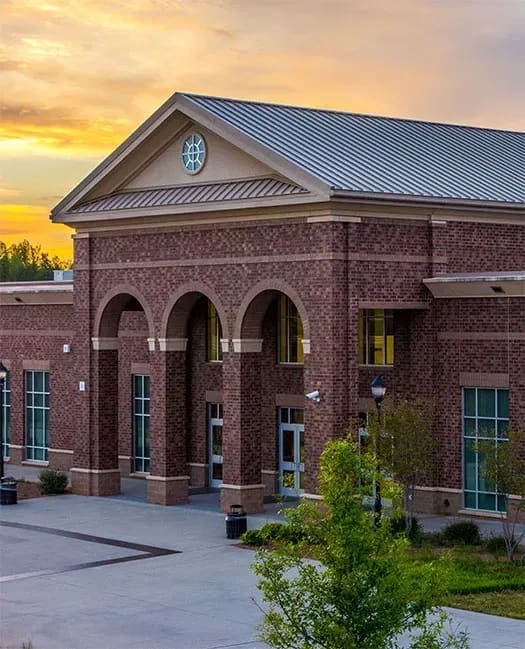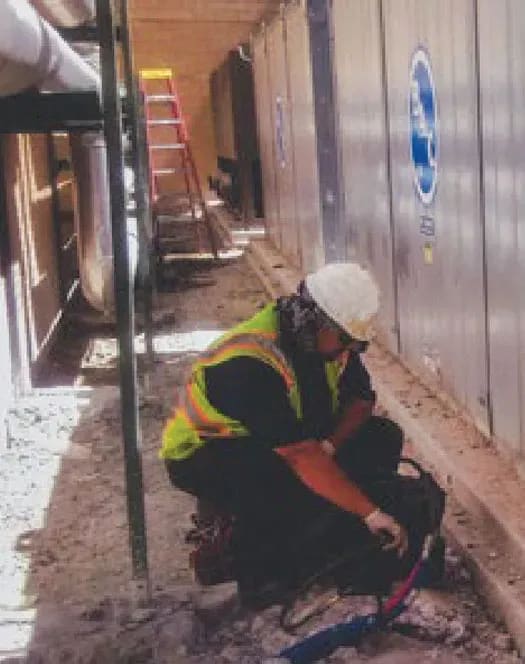Stabilizing Sinking Thermal Storage Units in Colorado
Problem
A middle school in Denver, Colorado, utilized a pair of ice chiller thermal storage units (TSUs) for the school’s refrigeration and cooling needs. The units featured warning signs that stated if the TSU is unlevel, substantial damage and malfunction is likely to occur. To avoid this, each TSU was placed on flat, independent, reinforced concrete pads. This wasn’t enough. The school discovered that the supporting concrete slabs had settled and obstructed the TSUs’ connection lines in the process. It was of the upmost importance to the school district that the TSUs be functioning at capacity in time for the upcoming school year, so both TSUs were taken out of service for repairs.
Analysis
The TSU’s were located on top of weak, expansive soils. The dry weight of the TSU with its concrete pad was 32,000 pounds (16 tons). At maximum capacity, the TSUs and their concrete pads each weighed over 133,000 pounds (56 tons). This heavy load caused the expansive soils under the TSUs to shift and render the concrete slabs unlevel. To avoid the excessive time and monetary costs of relocating each TSU, the school decided to hire URETEK for an onsite repair using their URETEK Deep Injection® (UDI) process to densify weak soil zones beneath the concrete pads.
Solution
URETEK took elevation profiles to determine the best locations for UDI injections. Once the optimal locations were determined, operators injected URETEK 486 Star® polymer at a three-foot depth. By using an angled injection, URETEK crews allowed for greater material coverage to maximize TSU stability. They stabilized the weakest soil zones first and followed up with additional injections to realign the pads within the 0.75-inch tolerance requirement for the TSUs to function properly.
Result
In just one day, URETEK completed the repair and immediately returned the TSUs to service. UDI treatment increased the load bearing capacity of the soil beneath the TSUs to properly support their maximum capacity weight, and the concrete pads supporting the TSUs were re-aligned. URETEK provided a timely, cost-efficient, and permanent solution for the Denver school.
URETEK Deep Injection® (UDI)
Widely referenced throughout our industry, UDI involves the injection of structural polymer into base and subgrade soils to increase the load bearing capacity. This is achieved by injecting the polymer through small holes drilled directly through the pavement structure to depths determined by site-specific analysis. Our URETEK 486 Star® material flows easily into voids and weak zones within the soil mass below. Through a controlled chemical reaction, the expanding polymer compacts surrounding soils and applies a controlled pressure on targeted areas of the affected pavement above. If needed, a multi-injection design plan is utilized to gently return the pavement to its original grade. The composite material quickly cures into a strong, dimensionally stable, and water-resistant geo-material, providing years of reliable service.
URETEK 486 Star®
URETEK 486 Star® polymer is a two-component, high-density, expanding thermoset polyurethane system. It was developed to be the ideal solution for under-sealing, void filling, lifting of settled pavement, stabilization and stiffening of weak soils, and for encapsulating and sealing buried infrastructure. URETEK 486 Star® is environmentally inert, non-toxic, and resists underground water erosion or weakening due to its industry-leading hydrophobic properties.

